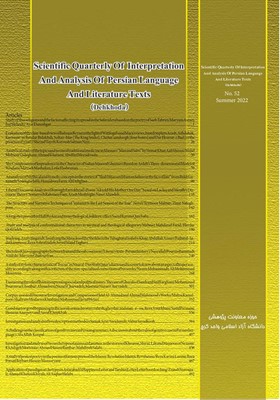Good start or good beginning in the novels ermia; bivatan; rahesh; gheydar; and man - e – ou. Reza Amirkhani
Subject Areas : Persian language and literature texts
Saeid Farmani
1
,
Hossein Azarpeyvand
2
*
![]() ,
Saeid Kheirkhah
3
,
Saeid Kheirkhah
3
![]()
1 - PhD Student, Department of Persian Language and Literature, Kashan Branch, Islamic Azad University, Kashan, Iran.
2 - Assistant Professor, Department of Persian Language and Literature, Kashan University, Kashan, Iran.
3 - Associate Professor, Department of Persian Language and Literature, Kashan Branch, Islamic Azad University, Kashan, Iran.
Keywords: rahesh, gheydar, ermia, man - e – ou, Bivatan, Amirkhani, Good start,
Abstract :
One of the most important and crucial principles in storytelling; This is how the author enters the story. Where the first logical encounter with the work begins and the audience's perceptual and emotional curves coincide in the shortest time. Choosing the right starting point or happy beginning of a story has a long history in fiction But despite its tremendous impact on the story, its constituent elements and the reader's gaze and attention; It is not very popular and in most cases is not even considered as one of the main and important elements of the story. The sensitivity of the subject is that the reader must be influenced by the story and its general atmosphere in the opening sentences, communicate with the story and feel emotion in himself, otherwise he will not read the rest of the story. "Amirkhani" is one of the most successful writers in recent years who uses special techniques and new methods; It has attracted the attention of countless audiences. current study; The "beginning" of the story, its opening sentences and the general structure of the "beginning" in five works by Reza Amirkhani will be examined by descriptive-analytical method. The result of this research shows that the beginning of the story in Amirkhani's novels, as a definite necessity, has been able to act like a hook by inducing logical credibility and trap the reader until the end of the story.While the regular and logical connection of the beginning of the story with other elements and the general process of the narrative has created a beautiful tension for reading, it has prevented the failure of the story.
کتابها
ابراهیمی، نادر (1396) براعت استهلال یا خوش آغازی در ادبیات داستانی، چاپ اول، تهـران: نشر روزبهان.
احمدی، نصراله (1379) ساختار داستان کوتاه، چاپ اول، شیراز: موسسۀ فرهنگی، هنری و انتشاراتی میرزای شیرازی.
امیرخانی، رضا (1391) ارمیا، چاپ سوم، تهران: انتشارات افق.
امیرخانی، رضا (1387) بیوتن، چاپ پنجم، تهران: نشر علمی.
امیرخانی، رضا (1398) رهش، چاپ پنجم، تهران: انتشارات افق.
امیرخانی، رضا (1398) قیدار، چاپ پنجم، تهران: انتشارات افق.
امیرخانی، رضا (1385) من او، چاپ دوازدهم، تهران: سورۀ مهر.
بیشاب، لئونارد (1391) درسهایی دربارۀ داستاننویسی، ترجمۀ محسن سلیمانی، چاپ پنجم، تهران: نشر سورۀ مهر.
بینیاز، فتحاله (1394) درآمدی بر داستاننویسی و روایتشناسی، چاپ ششم، تهران: نشر افراز.
پاینده، حسین (1394) گشودن رمان، چاپ سوم، تهران: انتشارات مروارید.
پلیگمن، بنتز (1390) چگونه داستان بنویسیم؟، ترجمۀ بهرنگ اسماعیلیون، چاپ دوم، تهران: انتشارات روزبهان.
سعدی، مصلحالدین (1392) کلیات سعدی، تصحیح محمدعلی فروغی، چاپ اولف تهران: انتشارات سمیر.
سناپور، حسین (1393) یک شیوه برای رماننویسی، چاپ دوم، تهران: نشر چشمه.
کرس، نانسی (1391) شروع، میانه، پایان، ترجمۀ نیلوفر اربابی، چاپ دوم، شیراز: نشر رَسش.
مقالات
نوروزیان، مسعود، شکروی، شادمان، صحتی، افسانه. (1386). هنر شروع داستان در حکایات سعدی و داستانهای کوتاه غرب. پژوهش زبان و ادبیات فارسی، 7(4)، 1-10.
پایاننامه
نوربخش، فریدهالسادات. (1395). بررسی و تحلیل سازوکارهای شروع در داستان کوتاه فارسی. پایاننامۀ کارشناسی ارشد. گیلان. دانشگاه گیلان.
_||_Books
Ahmadi, Nasrallah (2000) Short Structure Structure, First Edition, Shiraz: Mirzai Shirazi Cultural, Artistic and Publishing Institute.
Amirkhani, Reza (1398) Gheydar, fifth edition, Tehran: Ofogh Publications.
Amirkhani, Reza (1398) Rahesh, fifth edition, Tehran: Ofogh Publications.
Amirkhani, Reza (2006) Man - e – ou, Twelfth Edition, Tehran: Surah Mehr.
Amirkhani, Reza (2008) Bivatan, fifth edition, Tehran: Scientific publication.
Amirkhani, Reza (2012) Eremiah, third edition, Tehran: Ofogh Publications.
Biniaz, Fathullah (2015) Introduction to fiction and narrative studies, Sixth Edition, Tehran: Afraz Publishing.
Bishab, Leonard (2012) Lessons on storytelling, translated by Mohsen Soleimani, fifth edition, Tehran: Surah Mehr Publishing.
Ebrahimi, Nader (2017) Good start in fiction, first edition, Tehran: Roozbehan Publishing.
Kress, Nancy (2012) Start, middle start, end, translated by Niloufar Arbabi, Second Edition, Shiraz: Rasesh Publishing.
Payende, Hossein (2015) Open a novel, Third Edition, Tehran: Morvarid Publications.
Pligman, Bentz (2011) How to write a story? ,Translated by Behrang Ismailiun, second edition, Tehran: Roozbehan Publications.
Saadi, Moslehuddin (2013) General saadi, edited by Mohammad Ali Foroughi, published by Olf Tehran: Samir Publications.
Snapour, Hossein (2014) A way to write a story, Second Edition, Tehran: Cheshmeh Publishing.
Articles
Nowruzian, Massoud, Shokravi, Shadman, Sehati, Afsaneh. (2016). The art of beginning a story in Saadi anecdotes and short stories in the West. Persian Language and Literature Research, 7 (4), 1-10.
Thesis
Noorbakhsh, Farida al-Sadat. (2016). Investigation and analysis of starting mechanisms in Persian short stories. Master Thesis. Guilan. University of Guilan.

